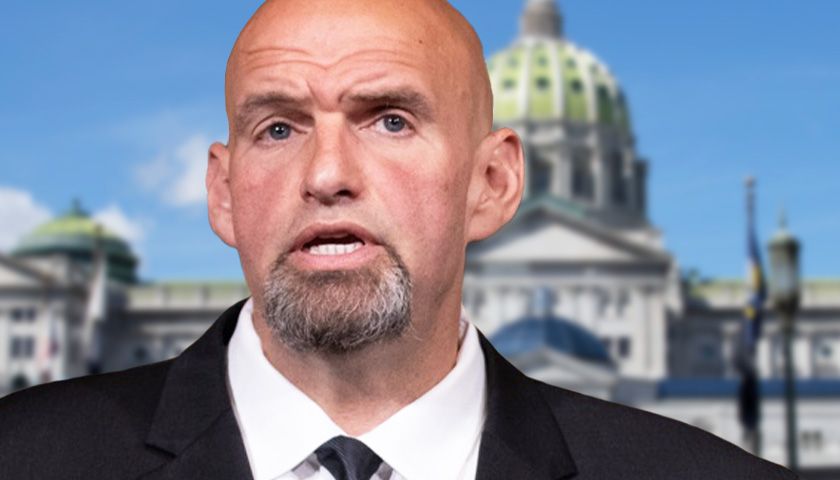Pennsylvania’s Senate State Government Committee on Monday heard expert testimony on possible changes to the state’s rules for handling instances when the governor or lieutenant governor cannot perform his or her duties.
The issue has become especially salient ever since Lt. Gov. John Fetterman (D) suffered a stroke on May 13. He recovered but only gradually returned to his job and to his U.S. Senate campaign. He missed 18 session days as presiding officer of the Pennsylvania Senate, leaving him out of the conclusion of budget deliberations.
Fetterman’s stroke was the third instance of Pennsylvania’s Act 347 of 1974, which concerns an executive’s temporary inability to preside, coming into play. The first instance occurred in 1993 when Gov. Bob Casey Sr. (D) underwent a rare heart and liver surgery and Lt. Gov. Mark Singel (D) assumed his duties for six months. The second came in 2014, when Gov. Tom Corbett (R) underwent a hernia repair and Lt. Gov. Jim Cawley (R) assumed Corbett’s responsibilities for 85 minutes.
Both Casey and Corbett designated themselves medically incapable of carrying out their gubernatorial tasks. Fetterman was the first lieutenant governor whose disability would render him unable to see to his duties and the first state executive whose disability was not self-reported to the General Assembly.
Per Act 347, a majority of Gov. Tom Wolf’s (D) cabinet reported Fetterman’s temporary incapacitation to the legislature. Senate President Pro Tempore Jake Corman (R) resultantly acted as lieutenant governor for five days.
Now lawmakers are pondering whether updates are needed to the disability procedure act. A month ago, committee chairman David Argall (R-Mahanoy City) proposed a law requiring any statewide elected official with an urgent medical condition to disclose that condition to the governor and legislative leaders. Several other changes, not yet formally proposed, were contemplated in the course of Monday’s hearing.
“Continuity of government and public notifications, I believe we would all agree, are, regarding the ability to carry out the official duties of top elected officials, a serious concern,” the senator told colleagues.
Argall’s committee heard from Brian J. Gaines and Brian D. Roberts, professors at the University of Illinois and Principia College respectively on various states’ approaches to state-executive incapacity.
One difference between Pennsylvania and many states is that the former does not insist on the input of a medical professional in determining whether a governor or lieutenant governor must step aside from the job or can be permitted to resume it. Gaines and Roberts suggested such a requirement makes sense.
They furthermore advised broadening the description of the circumstances that may prevent a governor or lieutenant governor from performing his or her tasks. Pennsylvania law only addresses medical disability, but Gaines and Roberts said legislators should anticipate a situation, however improbable, that an executive would be held hostage or kidnapped.
“This is an area where you try to imagine the unthinkable,” Gaines said. “These things may seem unlikely, but they’re not impossible.”
State Senator Cris Dush (R-Wellsboro) reflected that lawmakers might consider amending the state constitution in this regard because that document and all relevant legislation refer to “disability” rather than “incapacitation.”
Dush and several other senators expressed sympathy for Fetterman, who was asked to testify at the hearing but informed the committee he was unable to do so.
While no proposed changes other than Argall’s have yet emerged on this subject, there could end up being some resistance to altering state law significantly in this area. In written testimony, Singel suggested leaving the rules largely as they are.
“The language in the constitution and in the statutes is, in my opinion, sufficient to ensure a peaceful transition of power should either the Governor or Lieutenant Governor become disabled,” he wrote. “Additional requirements like establishing reporting timelines on notifications or other alterations would only add to the stress of what is, by definition, a challenging time for the public officials involved and for the Commonwealth itself. I would caution against ‘fixing’ a process that does not seem to be broken.”
– – –
Bradley Vasoli is managing editor of The Pennsylvania Daily Star. Follow Brad on Twitter at @BVasoli. Email tips to [email protected].
Photo “John Fetterman” by Lt. Gov. John Fetterman. Background Photo “Pennsylvania State Capitol” by Governor Tom Wolf. CC BY 2.0.




